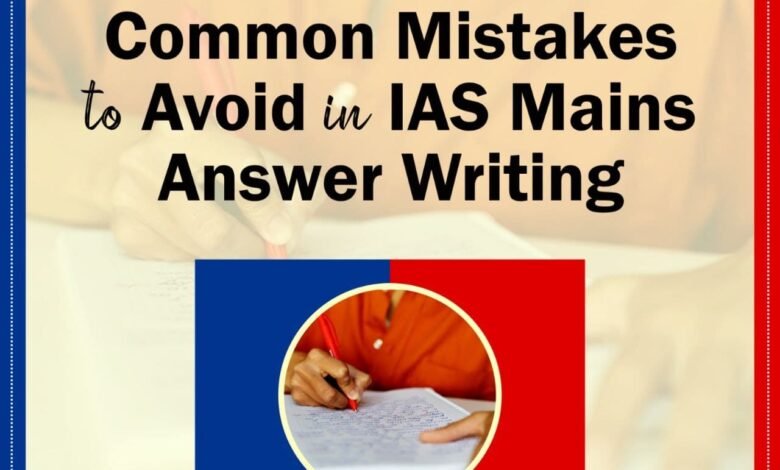Common Mistakes to Avoid in IAS Mains Answer Writing

In the journey of mastering IAS Mains answer writing, remember: ‘Success is the sum of small efforts, repeated day in and day out.‘ Let’s navigate through common mistakes and carve a path to excellence.
In the highly competitive arena of IAS Mains answer writing, avoiding common mistakes is essential for success. Here are some common mistakes and how to avoid them.
-
Lack of Understanding
One of the primary mistakes is not understanding the question thoroughly. Read the question multiple times to grasp its nuances and requirements. Ensure you’re addressing what is asked, not what you assume is asked.
-
Poor Structure
Answers should have a clear structure with an introduction, body, and conclusion. Each paragraph should focus on a specific aspect of the question and flow logically into the next.
-
Insufficient Content
Provide enough relevant content to substantiate your points. Avoid broad generalizations and instead provide particular instances, facts, and numbers to back up your points.
-
Ignoring Keywords
Pay attention to keywords in the question, such as ‘analyze,’ ‘evaluate,’ ‘discuss,’ etc. Tailor your answer according to these keywords to demonstrate a deeper understanding of the topic. Every question in the Mains Examination has certain criteria and should be answered properly. Below is a list of question types you might come across and their answering techniques.
-
-
- Explain/Elucidate– Explain the topic elaborately, starting with a brief introduction and concluding with a summary of your analysis.
- Discuss– Discuss the pros and cons of the topic from various angles and include your perspective as well.
- Critically Analyse– Evaluate the topic with a critical eye and highlight both positive and negative aspects of it.
- Compare and Contrast– Compare and contrast two or more concepts with advantages and disadvantages and conclude with your views.
- Opinion-based– Give your opinion on the topic and support it with relevant facts and examples.
- Citing Examples– Use real-life examples from events, history, and case studies to explain the topic and conclude with your views.
-
-
Overwriting or Underwriting
Striking the right balance between providing adequate information and being concise is crucial. Avoid lengthy explanations that deviate from the main point, as well as overly brief answers that lack depth.
-
Misinterpretation of Data
If the question involves data interpretation, ensure you interpret it accurately. Misinterpreting data can lead to incorrect conclusions and weaken your argument.
-
Lack of Clarity
Write in a clear and concise manner. Avoid using complex language or jargon unnecessarily. Make sure your ideas are expressed coherently to avoid confusion.
-
Ignoring Counterarguments
Acknowledge opposing viewpoints and address them in your answer. This demonstrates critical thinking and strengthens your argument by showing that you’ve considered multiple perspectives.
-
Time Management
Allocate your time wisely among different questions. Avoid spending too much time on one question at the expense of others. Keep an eye on the clock to ensure you complete all questions within the allotted time.
-
Poor Presentation
Neatness matters. Write legibly and use proper formatting techniques such as bullet points or numbered lists where appropriate. A well-presented answer is easier for the examiner to read and evaluate.
By being mindful of these common mistakes and implementing strategies to avoid them, you can significantly enhance your performance in the IAS Mains exam. Practice consistently and seek feedback to continuously improve your answer writing skills
Also Read: Top-Picked Current Affairs Quiz





